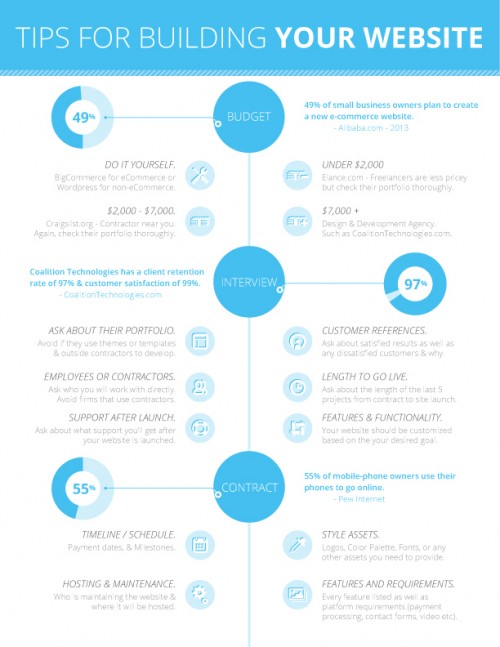Download the Building Your Website Business Cheat Sheet PDF here.
An excellent website is the core marketing foundation for your business. In 2012, ecommerce sales topped $1.3 trillion according to eMarketer and well over 80% of the US population is online on a daily basis. For your customers to find you, you need a great website to showcase your business.
Building a website is highly intimidating for non-technical people so I put together a brief review of options available to you and the steps necessary to get a website built.
The first question to ask is what kind of a website you need and what your budget is.
If you are seeking a website that is fairly standard and you have a small budget, then a website creation tool like BigCommerce for eCommerce sites will work great. If you just want to put content up and you don’t need any transaction processing, WordPress is an excellent platform. Both of these platforms are do it yourself and very easy to get a website live on a thin budget.
If you have a larger budget, generally it is wisest to seek out a company to assist you in design and development to build a great custom site that matches your needs. How can you find a good contractor? There are several resources available for building your website depending on your budget:
- Under $2,000:
- Elance.com – freelancers generally overseas who work cheap. Be very careful to give a detailed list of requirements and review applicants portfolios and reviews and ratings thoroughly.
- $2,000- $7,000:
- Craigslist.org- find a contractor in your area who will meet with you in person to plan out your website build. Only hire people with appropriate technical skills and great looking portfolios.
- $7,000+:
- Hire a design and development agency with a great reputation in your area. Use tools like Yelp.com to see a companies reviews from other customers. Look carefully at their portfolio and meet with them in person at their office. A great example would be CoalitionTechnologies.com.
Next, you need to interview the people doing your website development. Here are questions you should ask:
- Provide me a complete list of your portfolio items that your firm developed without any outside contractors? Please list templates or themes that were used for these portfolio items (AVOID firms that use templates and themes!)
- Send me references of other customers who have worked with you and been satisfied with the results. Have you had any dissatisfied customers? If so why were they dissatisfied?
- Is your work done by full time employees or contractors (AVOID contractors)
- How long did it take from signing the contract to the go live date for the last 5 websites you launched?
- What support do I get from your company after my website goes live?
- Who on your team will I be working with?
- What features and functionality will my new website need based on the description of my desired site I provided you?
Once you have a selected a company to work with, you need to finalize a scope of work. This is the most important phase and should clearly outline deliverables, timelines, and payments. People who do not provide a clear scope of work will most likely end up not able to deliver the final product you are looking for. Your contract to build your new website will need the following items in writing:
- Payment dates
- Timeline
- Who the primary users of your website are
- What logos, color palette, fonts or other materials will be required to be included in the site
- Where will the website be hosted
- Platform requirements (payment processing, contact forms, video, slideshows, etc)
- Who will be maintaining the website after launch
- List of particular features your website needs, list everything no matter how small or obvious it might seem
- Sitemap (list of all the pages you anticipate having when you launch the site)
You are probably very excited to get your new website launched, but doing your due diligence upfront will save you a lot of time and pain later on in maintenance and costs. Make sure you have a thorough scope of work for your website development and have a clear picture of how everything will come together.
